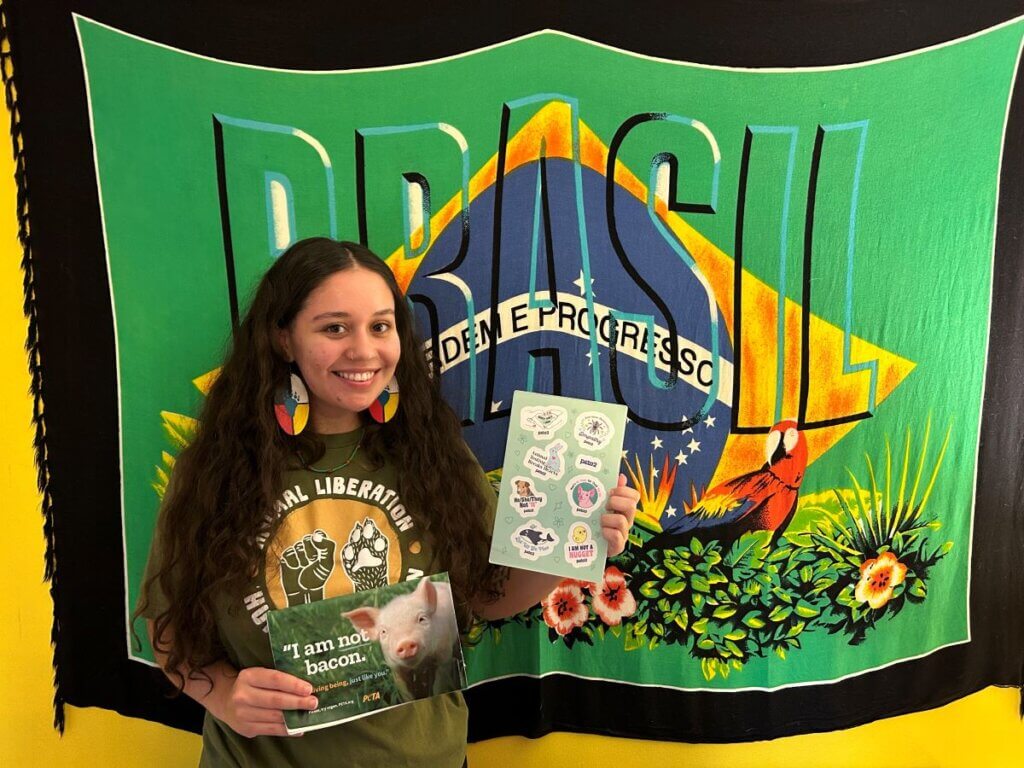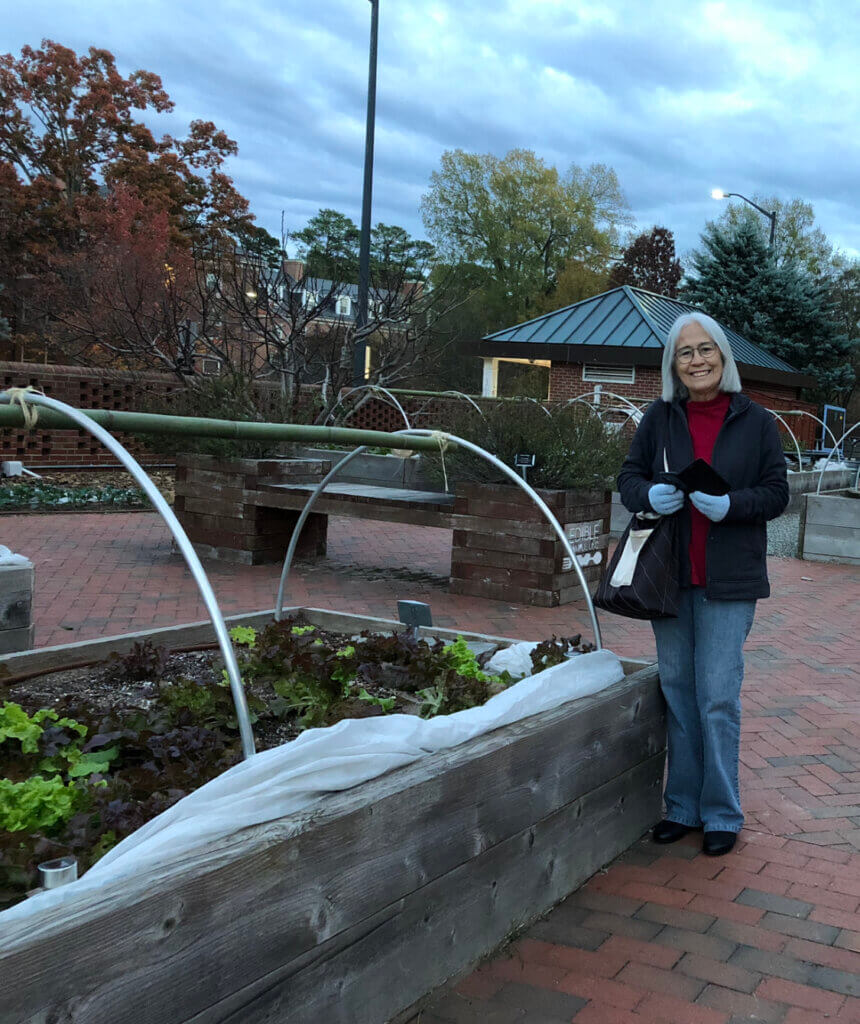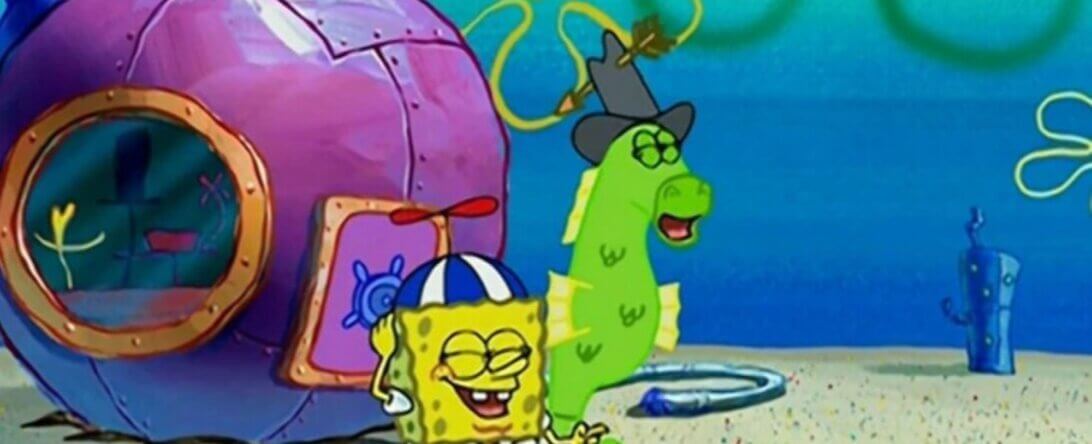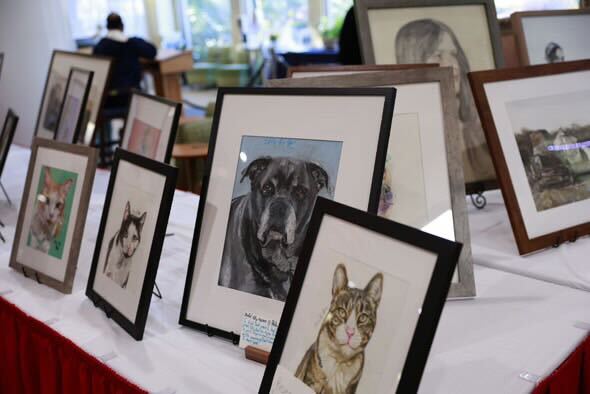Reconnecting With Our Roots as Latinx and Indigenous Vegans
So, you’re Latinx or Indigenous and thinking about going vegan? Here’s why that’s the best idea ever. 🐻🌱 I’m from the Charrúa nation in the south of Brazil. I identify as both Latinx and Indigenous—often putting the words together and saying LatIndigenous. But even if you identify as only Indigenous or Latinx, you’ll probably relate to this article.

I went vegetarian in kindergarten, before I even knew what the word meant. My mom raised me with the belief that we are one with the animals who share this land, so I was heartbroken to learn that we were paying for them to be killed, packaged, and sold as food. I cried and told her, “I never want to eat another animal again.”
At 18, I learned that animals are also hurt and killed for dairy and eggs. So I went vegan. peta2 believes that animals are not here to serve humans because they are here with us, not for us. This is a philosophy that resonates deeply with me and my culture. Our various Native nations are certainly not monoliths, but I believe many of us feel a connection and a desire to protect animals—our fellow neighbors and inheritors of Beadahá (Mother Earth). You’re right to want to lean into that responsibility.
Going vegan is definitely the best decision I ever made! Here are some ways you can look forward to reconnecting with your LatIndigenous roots, vegan-style:
Veganizing Traditional Recipes
Some people worry about upsetting family members by turning down their nonvegan dishes, but your family might surprise you! Getting into the kitchen with my tias or my avós and finding new recipes for our traditional dishes has been such a beautiful bonding experience that I wouldn’t trade it for anything. 👵🍽️
Check out these recipes for the vegan coxinhas and vegan pão de queijo that we love to make:
Reconnecting With Your Roots
“What about honoring our culture?”
By going vegan, you are honoring our culture and the old ways. We are the original protectors of this land and its animals. And we still protect it. Even though Indigenous people now make up only about 5% of the population, we protect 80% of the Earth’s biodiversity.
Besides, let’s be real: The way our ancestors made their meals is very different from the way nonvegan “food” is prepared today. I can’t imagine they would feel honored to know that the chicken on their descendant’s plate was genetically manipulated or that baby cows were torn away from their mothers. Instead, I believe they would rejoice to know that we’re going vegan and doing the work to liberate animals who, like our people, have endured many atrocities.
This report explains that many of our diets were largely vegetarian prior to colonization. But when conquistadors arrived in the Americas, they viewed animals as a means to an end and personal tastes as more important than respect for the freedom of others (humans and animals alike). So our traditional dishes changed (at times by force), but they can change again—and this time it’ll be our choice.
Our cultures consist of more than a single practice. We have many traditions that do not involve anyone’s suffering that are much more ancient and sacred than anything that came with colonization. I am confident that our traditions are strong enough to survive new forms while still honoring old ways and that we can survive cultural genocide without hurting other beings in the process.
My advice: Trust your intuition and go vegan as part of your decolonizing journey. You might even inspire others to do the same. 💚🥬

Celebrating Carnival in Style
Feel good about dancing all week in a cruelty-free carnival outfit by using faux feathers for your elaborate headdress and staying away from any clothing made out of materials derived from animals.
Recruiting Our Famílias
We didn’t create the climate catastrophe and we’re not the main contributors to it, but that doesn’t mean we shouldn’t try to fight it. It’s still a matter of life or death—for animals, for Mother Earth, and for us. Vegan food is planet-friendly, and there are many very affordable options right at your grocery store.
Of course, food scarcity is an issue on some reservations and in some Latinx areas. Many people supplement their diets by planting fruit trees or a vegetable garden. If you don’t have a backyard, you may be able to find a community plot, or you can grow food on your balcony if you have one. Vegan food can also be ordered online. Choosing vegan whenever possible will help animals and the Earth enormously.
And no matter what your situation is, you can use your voice to advocate for vegan food. You can talk to your family and friends, and you can try to persuade companies and governments to invest in providing sustainable, affordable, and accessible plant-based options for everyone. 🌱🗣️
Educating the Community
Something I’ve heard before is: “Natives used to hunt for food, and they honored the animal. It’s the same thing.” Usually the people saying this are not Natives. And it’s a double red flag when they use the past tense to talk about us. We’re still here, and most of us shop at grocery stores now, just like everyone else. You can help inform them by sharing these facts or recommending that they read this article. There’s no comparison between our ancestors’ occasional hunt and the unnatural, dishonorable, and unnecessary mass domestication and violent breeding-to-kill methods of today’s factory farming.
Also, producing animal products actually hurts Native and Latinx people. About 77% of all farmworkers are Hispanic, according to a National Agricultural Worker Survey. The working conditions at many farms are very distressing. For example, workers are exposed to chemicals and feces-saturated air and are forced to work at a breakneck pace, and they can accidentally inject themselves with vaccines meant for thrashing animals who are desperate to escape. “Chicken Doctors and the Trials of Transcendence,” by Dr. Geovani Ramírez, is an essay that takes a deep dive into this problem.
This industry also requires so much land. Our land. When colonizers first arrived, the Catholic Church became the biggest landowner in Latin America and developed commercial agriculture to gain an economic foothold. Today, companies are still using our land and expanding every day. Cattle ranchers are burning down one of the planet’s most precious resources, the Amazon rainforest, including territories protected by Indigenous tribes, in order to clear more land for cattle ranching, which decimates wildlife populations. A documentary called The Territory, now streaming on Disney Plus and Hulu, addresses this critical issue.
New Ways to Honor Yemanjá
Traditionally, it’s common for Brazilians to leave trinkets by the ocean for the Goddess Yemanjá. The belief is that if the waves take the trinkets, she has accepted the offering. If the trinkets are still there the next day, she has rejected it. While the goddess of the sea certainly appreciates all the love, it’s important to make sure you don’t leave items that would harm her oceans or the animals who live in them. Instead of leaving necklaces that may get tangled around a turtle’s neck or makeup that may end up in a whale’s stomach, leave offerings in the form of sand art. Write your desires for her blessing in the sand and check back the next day to see if the waves washed over them to bring you good fortune. Then show her your gratitude by organizing periodic beach cleanups throughout the year.
There’s so much to look forward to when incorporating vegan living into our rich traditions. I encourage you to find ways to expand on this list of ideas, be proud of your compassion and your culture, and know that by going vegan you’re honoring Beadahá (Mother Earth), animals, your own body, and our original roots in the process.
If you have any questions about going vegan, e-mail us at [email protected]. We’re here to help every step of the way. Take care, relatives. 🤎🌾🌬️
Text peta2 to 30933 for ways to help animals, tips on compassionate living, and more!

Terms for automated texts/calls from peta2: http://peta.vg/txt. Text STOP to end, HELP for more info. Msg/data rates may apply. U.S. only.




